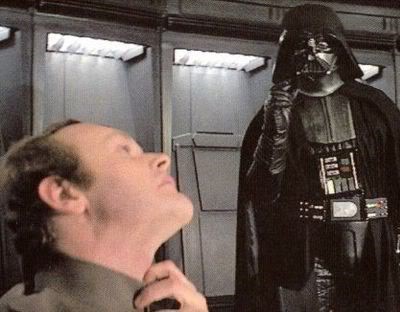How would you coach Winnie the Pooh to be more Darth Vader-ish?
Or, to frame it less extremely, “How would you coach a really accepting person to be more demanding; or a really demanding person to be more accepting?” Perhaps you wouldn’t begin this type of coaching engagement in the first place citing Naval philosopher Popeye, “I am what I am and that’s all that I am.” In either case, this post explores the temptation to move the performance needle too quickly and how helping learners make small steps can be a coach’s best ally.
Kristoffer Kristensen, Senior Director of Learning and Development at a health science company, wrote a terrific blog last year, The ‘Role’ of the Leader. In the post he invites us to: “Imagine the impact on the film Star Wars if Winnie the Pooh auditioned for—and won—the ‘role’ of Darth Vader.” Kris provided a link to a funny Youtube video featuring a voice-actor reading Vader lines from the movie as Pooh.
Here is the link to Kris’ thought provoking post. https://kristofferb.wordpress.com/2015/05/26/the-role-of-the-leader/
Here is the link to a voice-actor reading Darth Vader lines as Winnie the Pooh. https://www.youtube.com/watch?v=eLXTDirrQ5w
 It’s funny chiefly because of the incongruency. Can you hear it? Instead of the baritone, commanding and menacing voice of James Earl Jones in the iconic choking scene, we hear the warm, laid back, roly-poly voice of Winnie, “I find your lack of faith disturbing.” It doesn’t fit.
It’s funny chiefly because of the incongruency. Can you hear it? Instead of the baritone, commanding and menacing voice of James Earl Jones in the iconic choking scene, we hear the warm, laid back, roly-poly voice of Winnie, “I find your lack of faith disturbing.” It doesn’t fit.
After reading Kris’ post, a question occurred to me: “How often as coaches—either external coach or manager-as-coach—do we end up coaching a person who needs to make a significant shift in the way he or she leads?” Coachees and sponsors of coaching engagements have asked our organization for support in such situations. For simplicity, let’s put to the side those specific and potentially counter-productive situations when coaches are asked to help a leader become a person they simply aren’t hard-wired to be; in the real world—and with apologies to Ben, Luke and Yoda—I don’t think the greatest coaches on this planet or Alderaan could influence Winnie to lead like Vader or vice-versa.
Instead, let’s focus on a far more frequent situation leadership coaching partnerships face: the expectation of moving a leader from where they are currently to a very different level of competence in a certain period of time.
Temptation of the ‘Pygmalion Effect’
In the George Bernard Shaw play Pygmalion and the musical version that was made into the movie, My Fair Lady, the premise is the same. A phonetics professor, Henry Higgins, wagers that he can teach a flower seller with a thick Cockney accent, Eliza Doolittle, how to speak “proper” English and, thereby, make her pass as a Duchess in high English society. In the hilarious Holiday classic, Trading Places, the Duke Brothers make a similar wager as to whether they can improve the life of Billy Ray Valentine. In organizational development circles, the ‘Pygmalion Effect’ is shorthand for how an increase in a leader’s expectations results in an increase in a direct report’s performance. We will not debate the validity of the Pygmalion Effect here (someone else can pick up that hot potato…).
The temptation for performers, coaches, managers and—with growing frequency—the sponsors of coaching engagements, is how quickly a performance shift can occur. Stakeholders often expect that significant shifts in performance of the coachee can occur within a couple of months. That Winnie can channel his inner Vader to motivate the organization to develop new virtual reality goggles in time for the Holidays ; or, that Vader can share a self-deprecating story–TED talk-style–at the next exec team off-site meeting. Leaps in development of that magnitude can happen, but they are rare and they take time. They make for great theatre, and, for most of us, these types of developmental expectations in short periods of time are not realistic.
However, when realistic achievements are strung together, coach and performer increase the probability of experiencing noticeable growth.
A Helpful Tool for Coaches and Performers: The Zone of Proximal Development
When it comes to people development, the concept of taking small steps is grounded in sound research—and common sense.
 The Zone of Proximal Development (ZPD) is the fancy-schmancy term for things a learner can do with help from a coach or trainer that they could not otherwise complete on their own. In the early 1900s, the original concept of ZPD was introduced by Soviet psychologist Lev Vigotsky (great hockey name, by the way). Since then, the concept has been developed, amended and expanded by educators and psychologists alike.
The Zone of Proximal Development (ZPD) is the fancy-schmancy term for things a learner can do with help from a coach or trainer that they could not otherwise complete on their own. In the early 1900s, the original concept of ZPD was introduced by Soviet psychologist Lev Vigotsky (great hockey name, by the way). Since then, the concept has been developed, amended and expanded by educators and psychologists alike.
For our purposes here, think about three related and slightly increasing-in-difficulty tasks. Here is an overly simplified example. Sarah—a second level leader—can give informative, effective presentations on business strategy (center circle). With the help of a coach or trainer, she is learning how to create greater audience interaction, meaningful discussions and debate during her presentations (next ring from the center). What Sarah cannot yet do—even with the help from a coach—is respond to challenging questions from senior leaders during a presentation without shutting down or becoming defensive (outermost ring).
In Sarah’s example, it may be an unreasonable stretch for her to learn–and be effective at–the skill of fielding challenging questions from her boss’s boss given where she is currently. With the right blend of will and skill, she’ll get there soon enough.
Barring an extraordinary crisis or existential threat that requires people to make extraordinary leaps in behavior overnight, it is helpful to keep the ZPD in mind. To return to the question at the beginning, a coach or manager using the ZPD frame might decide that the next outer ring for Vader would be for him to stop choking people who are overly confident in the technological capability of the Death Star.™ Well, on second thought…
A Better Way: Reasonable Outcomes
If you are a coachee and your manager or external coach is pushing you beyond what you think is reasonable—and you want to blow their mind a little—feel free to ask, “Yo, Coach Yoda, that whole ‘do or do not’ thing may look good in PowerPoint, but are you stretching me outside of my ZPD?” Alternatively, if you are the manager or external coach and your coachee isn’t stepping up to their capabilities, feel free to ask, “Yo, Christopher Robin, do you think what I’m asking you to do is within your ZPD?” Both questions begin a powerful dialogue between coach and leader.

0 comments
Kick things off by filling out the form below.
Leave a Comment